Published
- 23 min read
Top Cloud Solutions for Businesses: Complete Guide
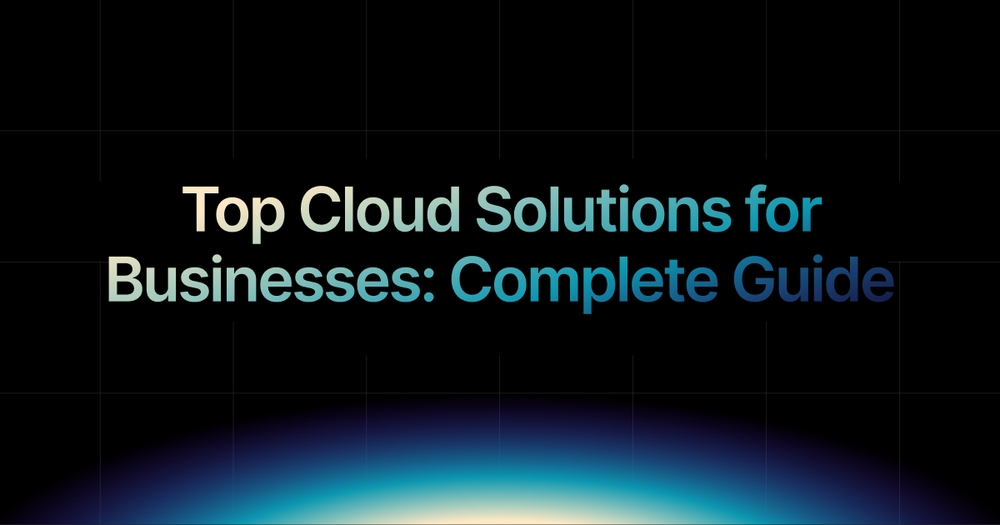
Key Highlights
- Cloud solutions are essential for modern businesses, offering scalability, cost savings, and enhanced data security.
- The top cloud service providers in 2025 include Kuberns, Amazon Web Services (AWS), Microsoft Azure, and Google Cloud Platform (GCP).
- Choosing the right cloud provider is critical for operational efficiency and supporting remote work.
- Companies are looking beyond traditional providers for platforms that are simple, affordable, and automation-driven.
- Modern AI-powered platforms help small businesses save up to 40% on cloud infrastructure costs.
- Understanding cloud computing models like IaaS, PaaS, and SaaS helps you select the best solution for your needs.
- Key factors for choosing a provider include performance, automation, security, and customer support.
Introduction
Cloud solutions are the backbone of modern businesses. Instead of investing in expensive servers and maintaining their own IT infrastructure, companies are relying on cloud platforms to host their applications, store data, and scale operations on demand. From startups building their first app to enterprises running mission-critical workloads, the cloud makes it easier to stay agile and competitive.
In 2025, Businesses need solutions that balance performance with affordability, while also offering automation and security. The challenge is that with so many providers in the market, ranging from global hyperscalers to developer-focused platforms, it can be difficult to decide which one best fits your needs.
In this guide, we’ll explore the top cloud solutions for businesses, compare their strengths and weaknesses, and highlight how modern, AI-powered platforms are helping startups and SMBs reduce costs and complexity.
Whether you’re a startup or a large enterprise, leveraging cloud services allows you to innovate faster, serve customers better, and stay competitive. As we look forward, selecting the right cloud provider is more critical than ever to ensure your business is built on a foundation that can support future growth and challenges.
Top Cloud Solutions for Businesses
Finding the best solution among the many cloud computing services available can be a challenge. The ideal cloud provider depends on your company’s requirements, budget, technical expertise, and specific goals. From enterprise-grade infrastructure to developer-friendly platforms, the options are vast.
To simplify your decision, we’ve compiled a list of the top 10 cloud providers for 2025. This guide breaks down their strengths, limitations, and ideal use cases to help you find the perfect fit for your operational efficiency and growth ambitions.
1. Kuberns: AI-Powered Cost-Saving Platform for Startups and SMBs
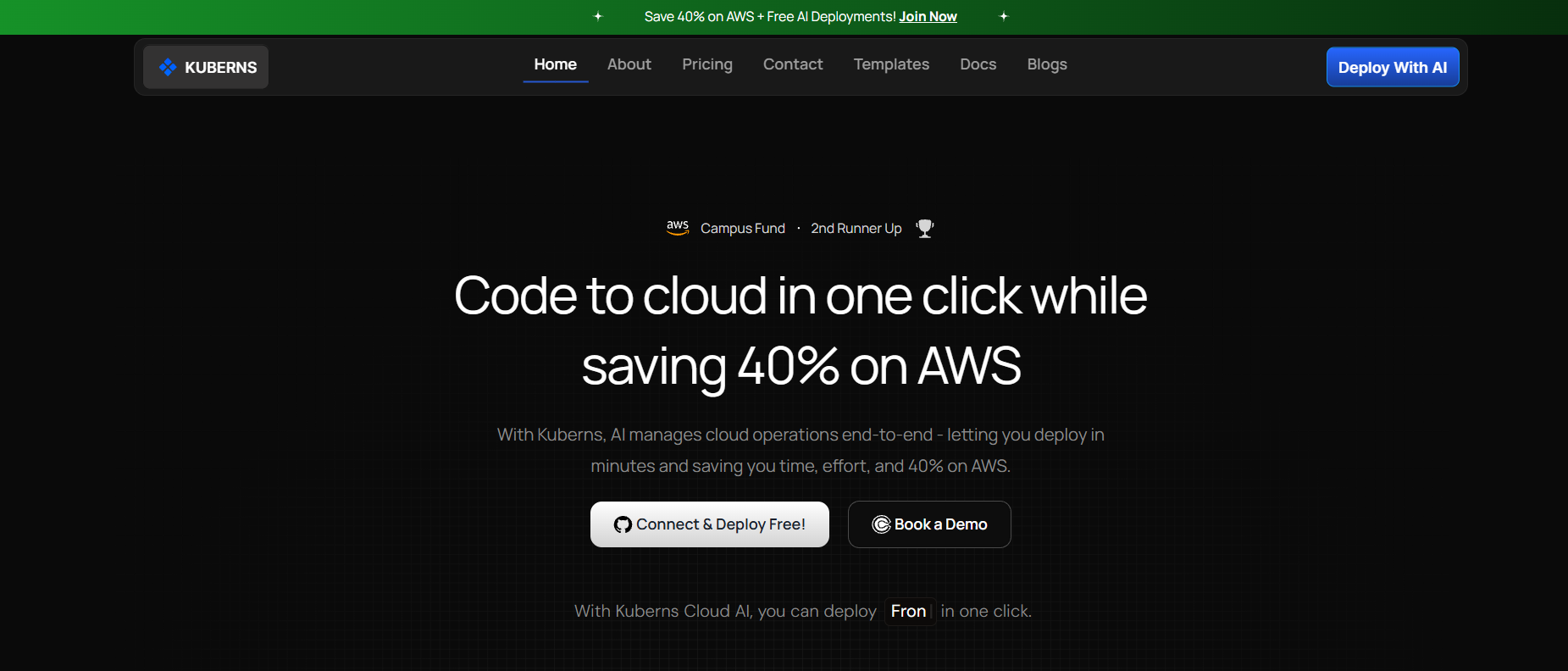 Kuberns stands out as the best cloud platform for startups and small to medium-sized businesses (SMBs) looking to optimise costs without sacrificing performance. It is a modern, AI-powered platform designed to simplify cloud deployment and management, making it accessible even for teams without extensive DevOps resources. Its primary advantage is its ability to help businesses save up to 40% on their AWS expenses through intelligent optimisation.
Kuberns stands out as the best cloud platform for startups and small to medium-sized businesses (SMBs) looking to optimise costs without sacrificing performance. It is a modern, AI-powered platform designed to simplify cloud deployment and management, making it accessible even for teams without extensive DevOps resources. Its primary advantage is its ability to help businesses save up to 40% on their AWS expenses through intelligent optimisation.
This platform uses generative AI to analyse your needs and automate resource allocation, ensuring you only pay for what you use. This focus on cost savings and ease of use makes it a powerful choice for growing businesses that need to manage their budgets carefully.
By streamlining the deployment process, Kuberns allows your development team to focus on building great products instead of managing complex infrastructure.
If you’re looking for a platform that simplifies automated software deployment, Kuberns provides the tools you need to succeed efficiently.
2. Amazon Web Services (AWS): Enterprise-Grade Cloud Infrastructure
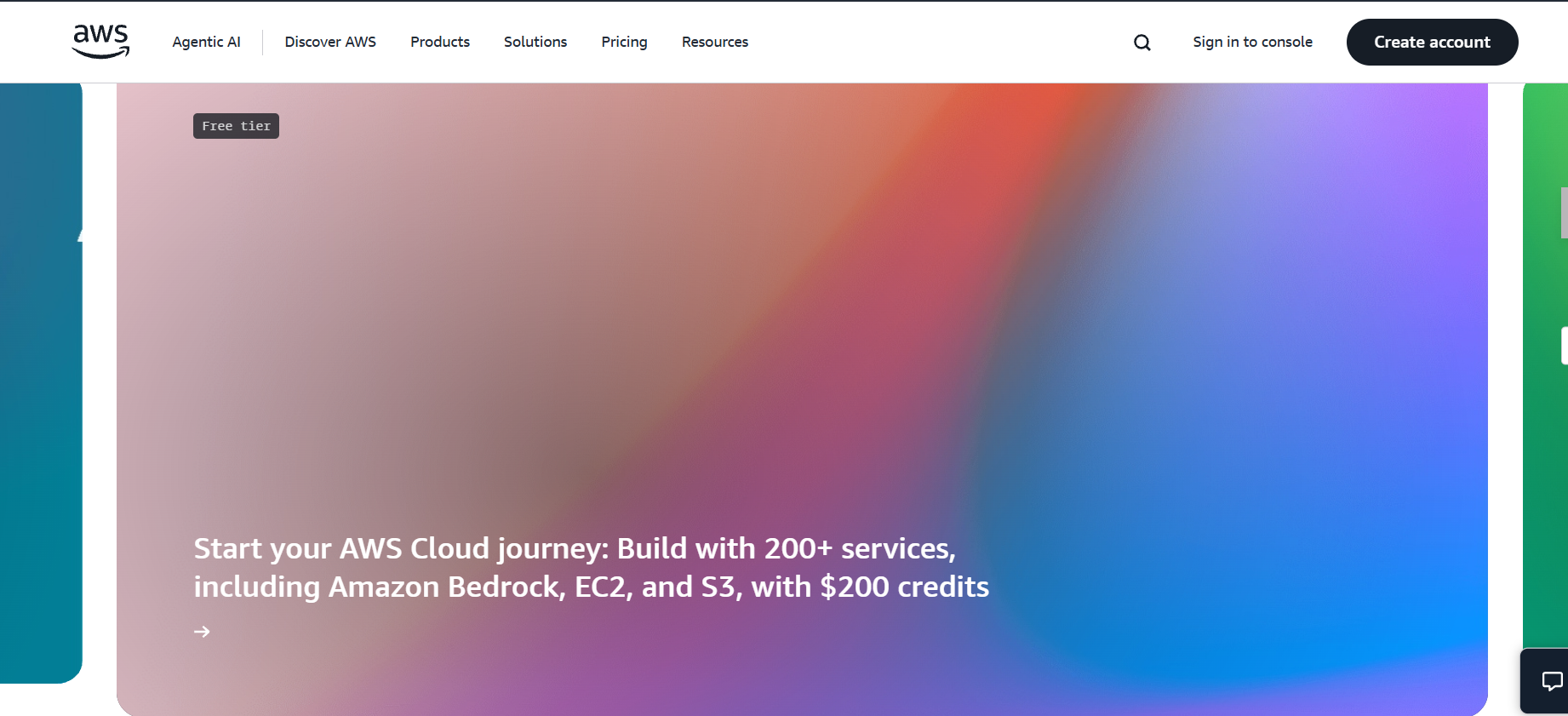 Amazon Web Services (AWS) is the dominant force in the cloud computing market, holding the largest market share globally. It offers an extensive portfolio of over 200 services, including computing (EC2), storage (S3), and databases (RDS). This vast range of tools makes it a go-to choice for enterprises that require a robust and scalable cloud infrastructure.
Amazon Web Services (AWS) is the dominant force in the cloud computing market, holding the largest market share globally. It offers an extensive portfolio of over 200 services, including computing (EC2), storage (S3), and databases (RDS). This vast range of tools makes it a go-to choice for enterprises that require a robust and scalable cloud infrastructure.
Its strengths lie in its mature ecosystem, comprehensive service offerings, and a strong track record of reliability. It caters to everyone, from startups to large corporations, and is particularly strong in machine learning and IaaS.
However, the sheer number of services can be overwhelming for new users, and its complex pricing structure can lead to unexpected costs if not managed carefully.
3. Microsoft Azure: Integrated Hybrid Cloud Services
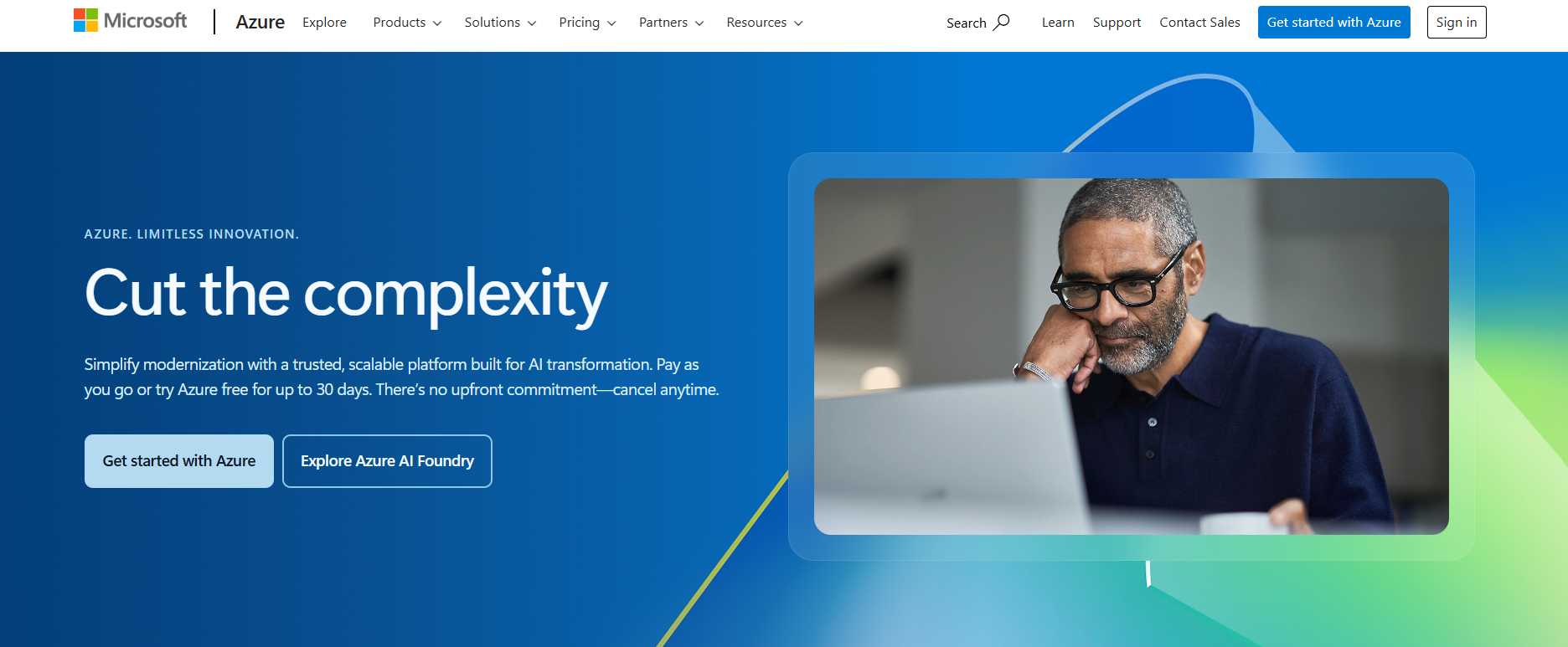 Microsoft Azure is a powerful competitor to AWS, especially for enterprises already invested in the Microsoft ecosystem. Its key differentiator is its seamless integration with other Microsoft products like Office 365 and its strong support for hybrid cloud environments. This allows businesses to extend their on-premises data centres to the cloud with ease.
Microsoft Azure is a powerful competitor to AWS, especially for enterprises already invested in the Microsoft ecosystem. Its key differentiator is its seamless integration with other Microsoft products like Office 365 and its strong support for hybrid cloud environments. This allows businesses to extend their on-premises data centres to the cloud with ease.
Azure offers a comprehensive suite of cloud services, including IaaS, PaaS, SaaS, and advanced tools for artificial intelligence and data analytics. Its commitment to hybrid capabilities makes it an excellent choice for organisations that need to balance public cloud flexibility with private cloud security and control.
With a strong focus on enterprise needs and a growing market share, Azure provides a reliable and secure platform for digital transformation. Businesses looking for integrated solutions that span on-premises and cloud environments will find Azure to be a compelling option.
4. Google Cloud Platform
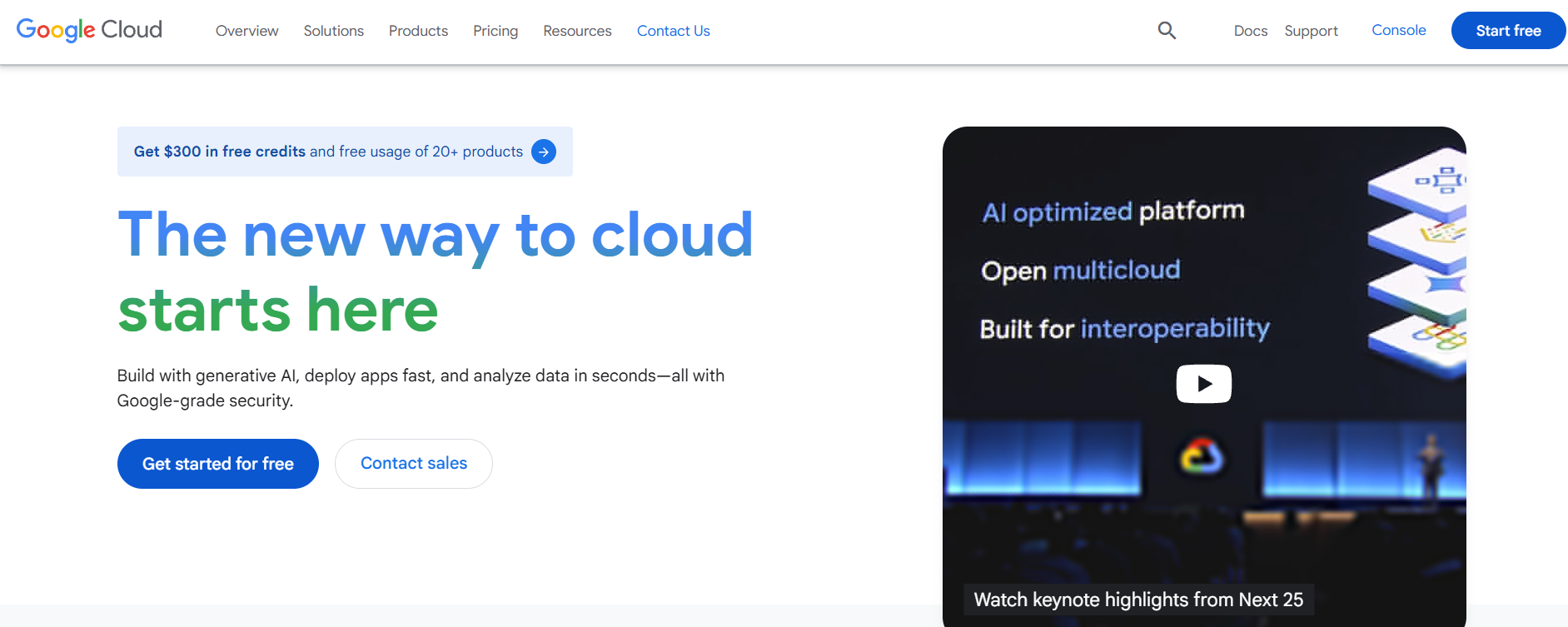 An extensive suite of cloud computing services, Google Cloud Platform (GCP), offers businesses exceptional scalability and robust cloud infrastructure. It accommodates various needs, from data storage and cloud security to advanced machine learning tools. Integral for operational efficiency, GCP supports cloud adoption while ensuring data safety and integrity.
An extensive suite of cloud computing services, Google Cloud Platform (GCP), offers businesses exceptional scalability and robust cloud infrastructure. It accommodates various needs, from data storage and cloud security to advanced machine learning tools. Integral for operational efficiency, GCP supports cloud adoption while ensuring data safety and integrity.
Organisations can leverage generative AI and powerful analytics, enhancing decision-making processes and customer relationship management. Seamless integration with other platforms, such as Google Drive, makes GCP a preferred choice for government agencies and diverse industries looking to optimise their cloud solutions effectively.
5. DigitalOcean: Developer-Friendly Cloud for SMBs
 DigitalOcean has built its reputation on simplicity and a developer-friendly experience. It is one of the best small business cloud solutions, offering straightforward pricing, an intuitive control panel, and excellent documentation. This focus makes it incredibly popular among startups, individual developers, and SMBs that need to get applications up and running quickly without a steep learning curve.
DigitalOcean has built its reputation on simplicity and a developer-friendly experience. It is one of the best small business cloud solutions, offering straightforward pricing, an intuitive control panel, and excellent documentation. This focus makes it incredibly popular among startups, individual developers, and SMBs that need to get applications up and running quickly without a steep learning curve.
The platform provides core cloud solutions like virtual private servers (Droplets), managed databases, and object storage. Its predictable pricing model helps businesses avoid the bill shock often associated with larger providers, making cloud adoption more accessible.
While it may not offer the extensive range of services that AWS or Azure does, DigitalOcean excels at providing the essential tools developers need with maximum ease of use.
For those exploring alternatives, it’s worth comparing it to other platforms in the market to find the best fit, and there are many powerful DigitalOcean alternatives available.
6. IBM Cloud: Secure Multi-Cloud Solutions for Enterprises
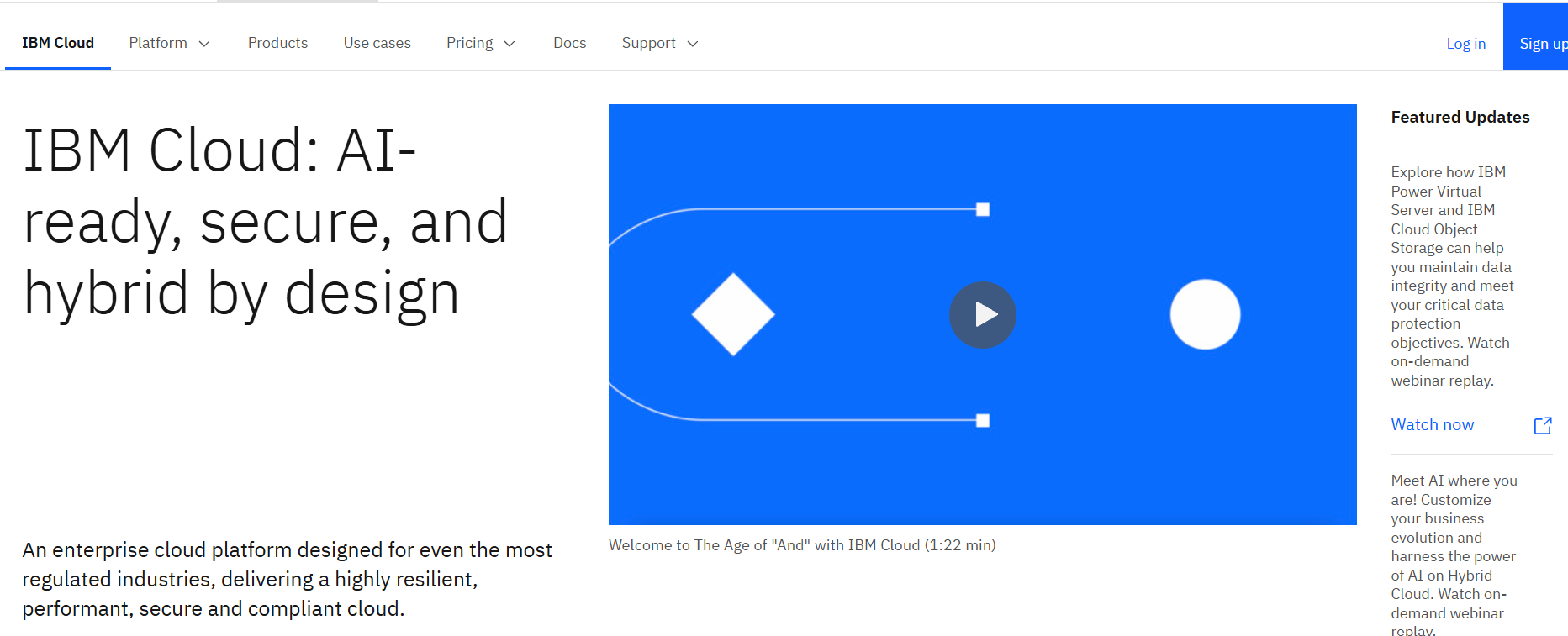 IBM Cloud targets enterprises with a strong focus on security, hybrid cloud, and multi-cloud management. It offers over 170 products and services, catering to businesses that need to integrate their existing on-premises infrastructure with modern cloud capabilities. IBM’s expertise in enterprise IT makes it a trusted partner for organisations in highly regulated industries like finance and healthcare.
IBM Cloud targets enterprises with a strong focus on security, hybrid cloud, and multi-cloud management. It offers over 170 products and services, catering to businesses that need to integrate their existing on-premises infrastructure with modern cloud capabilities. IBM’s expertise in enterprise IT makes it a trusted partner for organisations in highly regulated industries like finance and healthcare.
The platform’s key strengths include robust security measures, compliance certifications, and tools that facilitate a smooth transition to a multi-cloud strategy. It supports open-source technologies and provides solutions for AI, IoT, and blockchain, helping businesses innovate securely.
With a clear emphasis on disaster recovery and data protection, IBM Cloud is designed for companies that cannot afford to compromise on security or reliability. It’s an ideal choice for large organisations looking to build a resilient and secure digital foundation.
7. Oracle Cloud: Scalable Business Applications & Databases
 Oracle Cloud Infrastructure (OCI) is a strong contender in the enterprise space, leveraging its long-standing dominance in database technology. OCI is designed for high-performance computing and is particularly well-suited for running Oracle’s own suite of business applications and databases. It provides a scalable and secure environment for mission-critical workloads.
Oracle Cloud Infrastructure (OCI) is a strong contender in the enterprise space, leveraging its long-standing dominance in database technology. OCI is designed for high-performance computing and is particularly well-suited for running Oracle’s own suite of business applications and databases. It provides a scalable and secure environment for mission-critical workloads.
Oracle was one of the first vendors to offer IaaS, PaaS, and SaaS from a single platform, providing a comprehensive solution for businesses. Its distributed cloud portfolio allows customers to run services in their own data centre, offering hybrid flexibility.
While often associated with large enterprises, OCI offers competitive pricing and performance that can appeal to a broader market. Businesses heavily reliant on Oracle products or those seeking high-performance cloud infrastructure for their applications will find OCI to be a natural fit.
8. Alibaba Cloud: Affordable Global Cloud Hosting
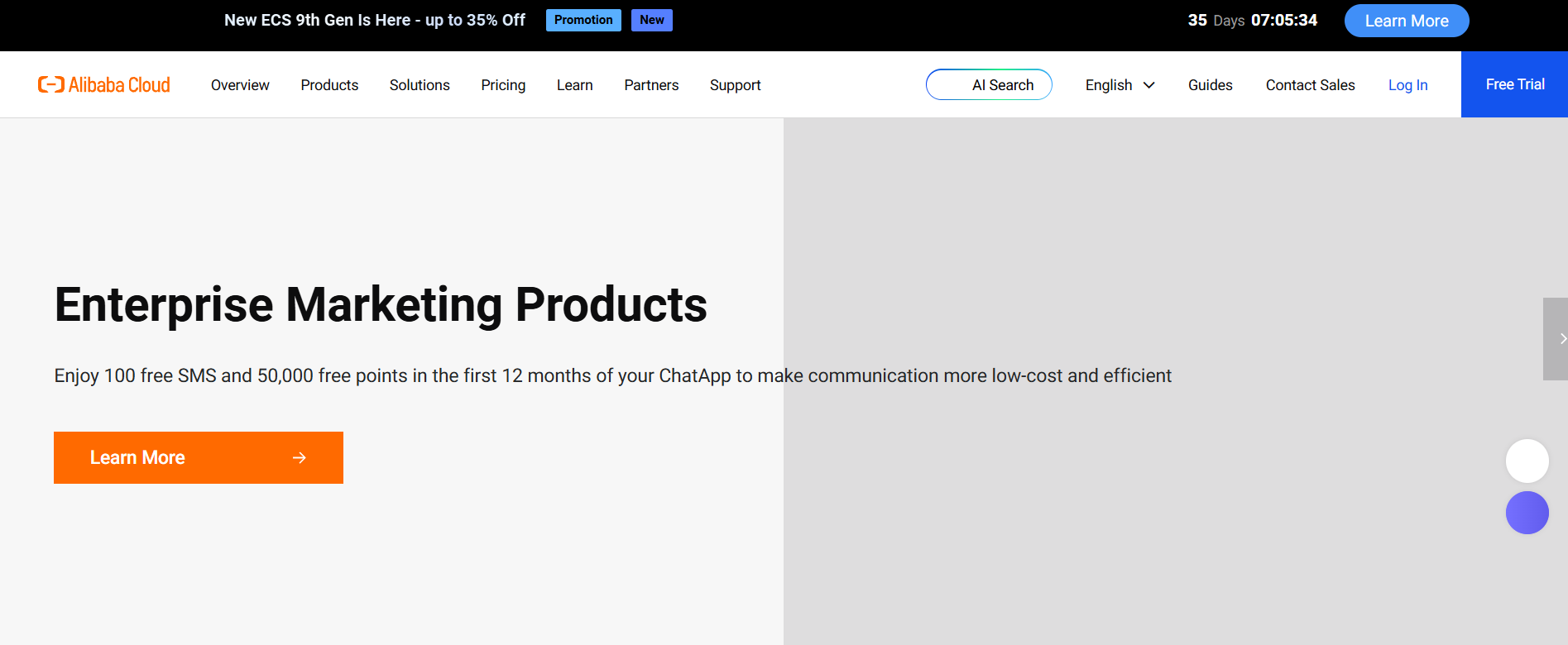 Alibaba Cloud is the leading cloud service provider in Asia and a growing global player. Originating from the e-commerce giant Alibaba, it offers a wide range of cloud services, including computing, data storage, networking, and analytics. Its primary appeal is its competitive pricing and strong presence in the rapidly growing Asian market.
Alibaba Cloud is the leading cloud service provider in Asia and a growing global player. Originating from the e-commerce giant Alibaba, it offers a wide range of cloud services, including computing, data storage, networking, and analytics. Its primary appeal is its competitive pricing and strong presence in the rapidly growing Asian market.
With a significant global reach, Alibaba Cloud provides affordable and reliable cloud hosting for businesses of all sizes. It supports major operations for enterprises, SMBs, and government agencies, making it a versatile choice for companies looking to expand their presence in Asia and beyond.
While it may not have the same brand recognition as the top three providers in Western markets, its aggressive pricing and expanding service portfolio make it an important option to consider, especially for businesses with a global focus.
9. Linode (Akamai Connected Cloud): Flexible VPS for Growing Businesses
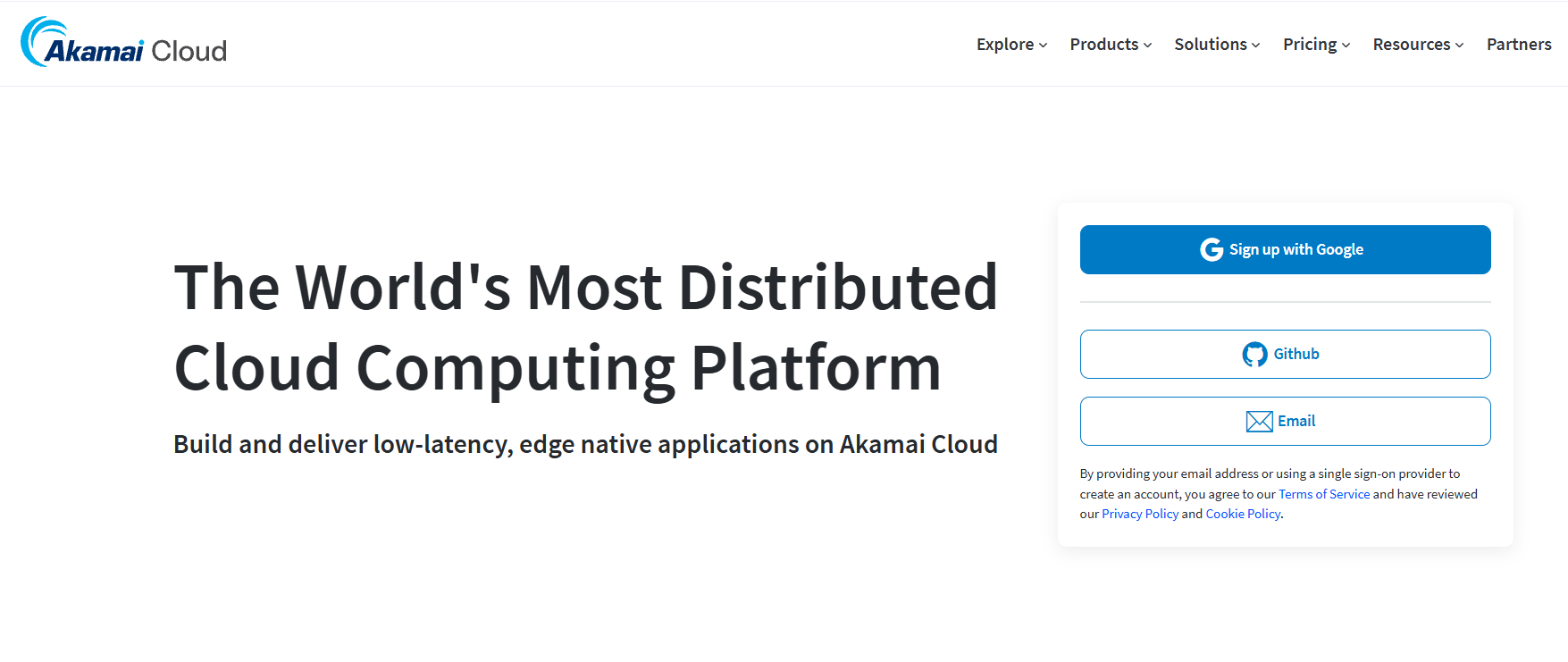 Now part of Akamai Connected Cloud, Linode is another provider known for its simplicity, developer-friendly interface, and predictable pricing. It offers flexible and powerful virtual private servers (VPS), making it a popular choice for developers, startups, and growing businesses that need reliable cloud hosting without complexity.
Now part of Akamai Connected Cloud, Linode is another provider known for its simplicity, developer-friendly interface, and predictable pricing. It offers flexible and powerful virtual private servers (VPS), making it a popular choice for developers, startups, and growing businesses that need reliable cloud hosting without complexity.
Linode’s integration with Akamai’s global edge network gives it a significant advantage in performance and security. This combination brings computing power closer to users, reducing latency and improving the experience for globally distributed applications. It provides Linux-based virtual machines, Kubernetes, and cloud storage with a straightforward approach.
For teams that value simplicity and transparent costs, Linode is an excellent choice. Its focus on core cloud computing services and its now-enhanced global network make it a strong competitor for businesses that have outgrown basic hosting.
10. Zoho Cloud: Cloud-Based Productivity & Collaboration Tools
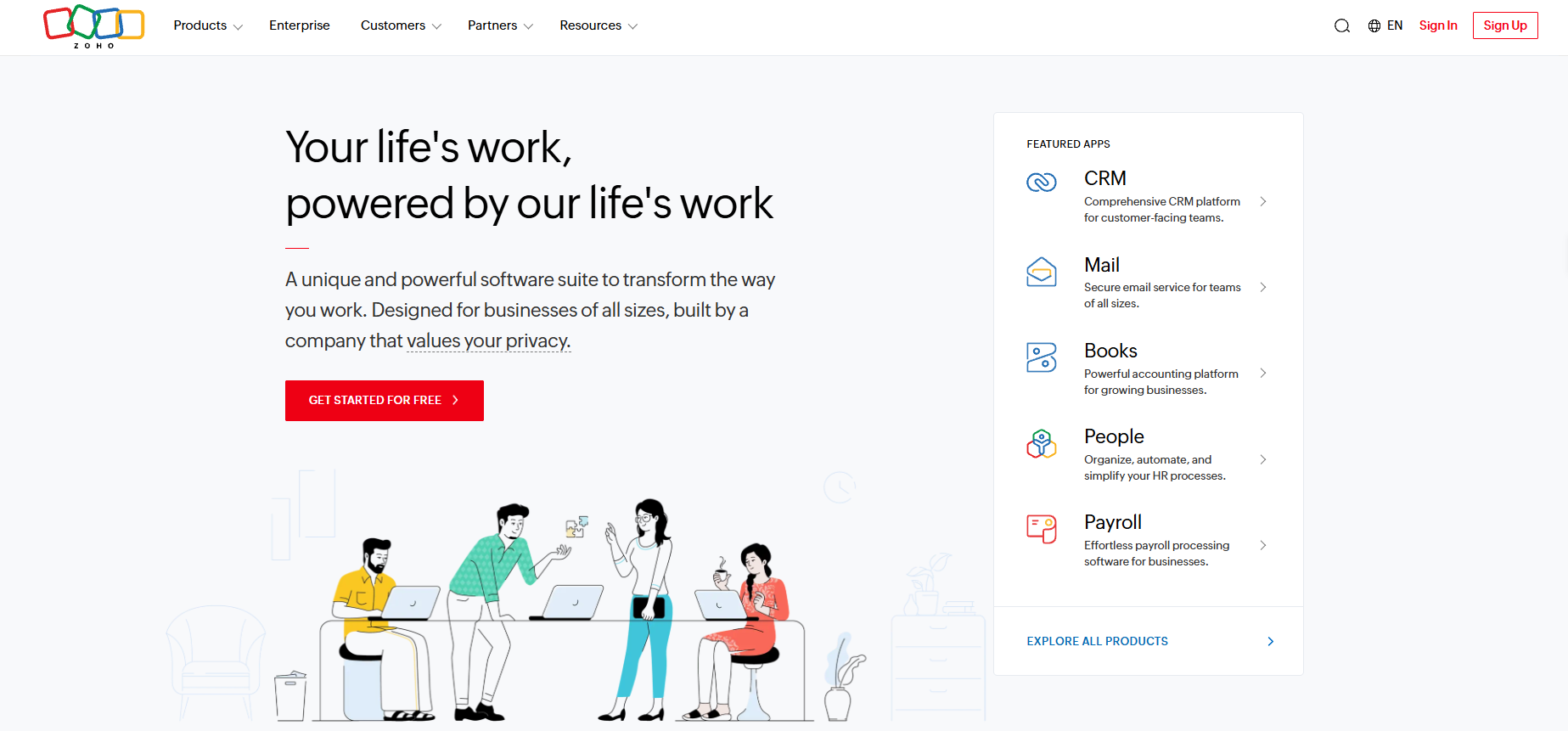 Zoho Cloud differentiates itself by focusing on a comprehensive suite of Software-as-a-Service (SaaS) applications designed for business productivity and collaboration. While not a traditional IaaS provider like AWS or Azure, Zoho offers an all-in-one ecosystem of tools that businesses rely on daily, including CRM, email, project management, and accounting software.
Zoho Cloud differentiates itself by focusing on a comprehensive suite of Software-as-a-Service (SaaS) applications designed for business productivity and collaboration. While not a traditional IaaS provider like AWS or Azure, Zoho offers an all-in-one ecosystem of tools that businesses rely on daily, including CRM, email, project management, and accounting software.
By hosting its own applications on its cloud infrastructure, Zoho provides a tightly integrated experience where different business functions can work together seamlessly. This is particularly beneficial for SMBs that need a cost-effective way to manage their operations without piecing together solutions from multiple vendors.
Zoho’s cloud-based tools empower teams to collaborate effectively, manage customer relationships, and streamline workflows. For businesses looking for a complete suite of productivity tools rather than raw cloud infrastructure, Zoho Cloud is an excellent and affordable choice.
“With the cloud, individuals and small businesses can snap their fingers and instantly set up enterprise‑class services.” - Roy Stephan, Director of IT Architecture & Engineering, Intelligent Decisions (Stressing the importance of cloud solutions for businesses)
What are the Key Benefits of Cloud Solutions for Businesses?
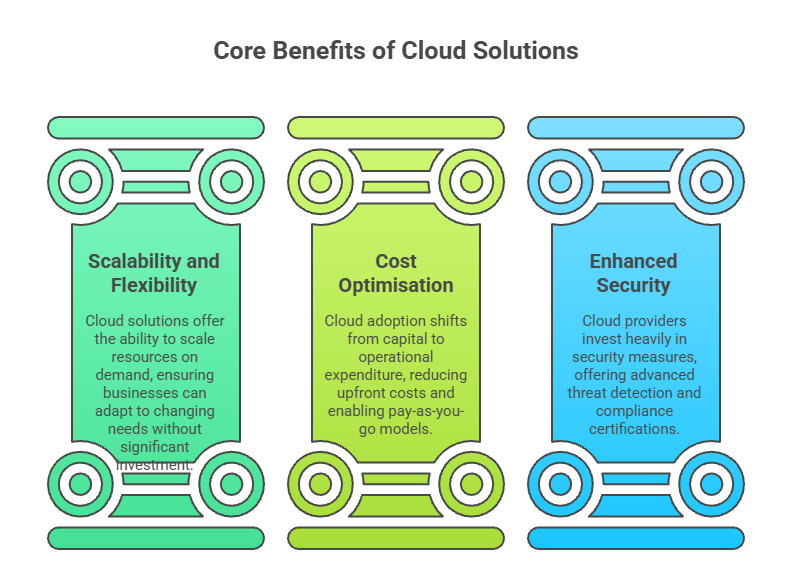 For modern businesses, the cloud is a catalyst for growth, enabling greater operational efficiency, flexibility, and innovation. Key benefits like significant cost savings and enhanced data security are driving this widespread cloud adoption.
For modern businesses, the cloud is a catalyst for growth, enabling greater operational efficiency, flexibility, and innovation. Key benefits like significant cost savings and enhanced data security are driving this widespread cloud adoption.
By moving away from traditional on-premises infrastructure, you can free up resources to focus on your core business goals.
Let’s explore some of the most impactful benefits that business cloud solutions provide.
Scalability and Flexibility for Growth
One of the most significant advantages of cloud solutions is the ability to scale your resources on demand. As your business grows, you can easily increase your computing power, storage, and networking capacity without investing in expensive physical hardware or a new data centre. This elasticity ensures you can handle sudden traffic spikes or expand your operations smoothly.
This flexibility works both ways. If you need to scale down during quieter periods, you can reduce your resource usage and only pay for what you need. This adaptability allows your business to stay agile and responsive to changing market conditions.
Key benefits of scalability and flexibility include:
- Rapid resource provisioning: Quickly add or remove computing resources in minutes.
- Support for variable workloads: Effortlessly manage fluctuating demand without service interruptions.
- Future-proofing your business: Ensure your infrastructure can support your long-term growth.
Cost Optimisation and Transparent Pricing
Cloud adoption is a powerful strategy for cost optimisation. By switching from a capital expenditure (CapEx) model to an operational expenditure (OpEx) model, you eliminate the need for large upfront investments in servers and other IT infrastructure. Instead, you pay a predictable monthly fee based on your usage.
Many cloud providers offer a pay-as-you-go model, which provides transparent pricing and helps control your budget. This means you are not paying for idle resources, leading to significant cost savings over time.
Modern platforms further enhance this by using AI to automate cost-saving measures.
Here’s how cloud solutions help with cost optimisation:
- Eliminate hardware costs: No need to buy, maintain, or upgrade physical servers.
- Pay-as-you-go models: Only pay for the cloud services and resources you consume.
- Reduced energy consumption: Lower your utility bills by not running an on-site data centre.
Enhanced Security and Compliance Features
Data security is a top priority for every business, and reputable cloud providers invest heavily in security measures to protect your information. They employ teams of experts to monitor for threats 24/7 and implement advanced security protocols that are often more robust than what a single business could manage on its own.
Cloud security includes physical security at data centres, network security, and data encryption both in transit and at rest. Additionally, major providers adhere to a wide range of industry-specific compliance standards, which simplifies your own compliance efforts.
Key security and compliance features to look for are:
- Advanced threat detection: Proactive monitoring to identify and mitigate security risks.
- Data encryption: Protecting your data from unauthorised access.
- Compliance certifications: Meeting regulatory requirements for your industry.
What are the Factors to Consider When Choosing a Cloud Provider?
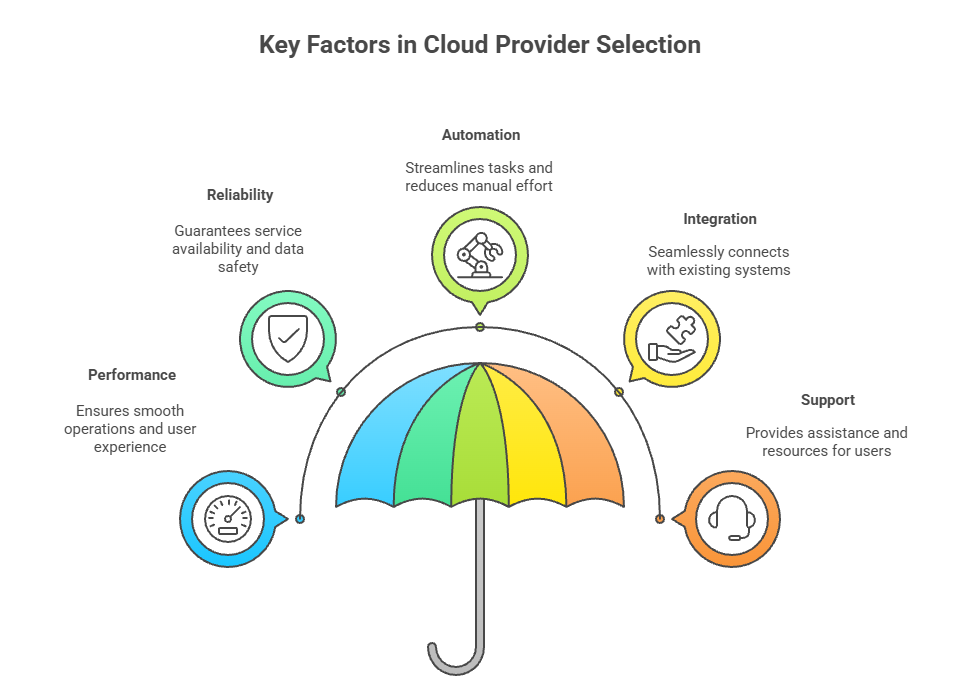 Choosing the right cloud provider is a strategic decision that will impact your business for years to come. With so many options available, it’s important to look beyond the price tag and evaluate providers based on factors that align with your long-term goals.
Choosing the right cloud provider is a strategic decision that will impact your business for years to come. With so many options available, it’s important to look beyond the price tag and evaluate providers based on factors that align with your long-term goals.
According to recent industry data, 44% of traditional small businesses now use cloud infrastructure, with 63% of SMB workloads and 62% of SMB data already hosted in the cloud.
This shows that for small businesses and startups, the cloud is no longer optional. It’s the de facto foundation for modern operations.
Key considerations include performance, reliability, automation capabilities, and the quality of customer support.
A thorough evaluation of these areas will help you select a partner that not only meets your current needs but can also scale with you as your business evolves.
Performance, Reliability, and Uptime Guarantees
Your cloud provider’s performance and reliability directly affect your user experience and business continuity. It is crucial to choose a provider typically guaranteed through a Service Level Agreement (SLA). An SLA of 99.9% or higher is the industry standard.
Look into the provider’s global infrastructure.
The location of their data centres can impact latency, so choose one with a presence in regions close to your customers. A reliable provider should also have robust disaster recovery plans to ensure your data is safe and your services remain available even if one data centre experiences an outage.
Automation Capabilities and Ease of Integration
Automation is key to improving operational efficiency and reducing the manual workload on your IT team. A good cloud provider offers solutions that allow you to automate routine tasks such as provisioning resources, deploying applications, and managing configurations. This frees up your team to focus on strategic initiatives.
Ease of integration with your existing tools and workflows is another critical factor. The cloud platform should seamlessly connect with your development, monitoring, and security software, or it should have all features in-built so that they don’t have to use multiple tools.
Support, Documentation, and Community Resources
Even the most intuitive platform can present challenges, so strong support is essential.
Evaluate the different levels of support offered by the cloud provider. Do they offer 24/7 technical assistance? Are there dedicated support representatives available? The right level of support can be crucial during critical incidents.
Comprehensive documentation is another sign of a mature and user-focused provider. Well-written guides, tutorials can save your team countless hours of troubleshooting.
Look for providers that invest in creating high-quality educational materials and best practices guides.
Finally, a vibrant community can be an invaluable resource. Active forums, user groups, and online communities provide a space to ask questions, share solutions, and learn from the experiences of others.
- Support tiers: Choose a plan that matches your business needs and budget.
- Quality of documentation: Ensure resources are clear, up-to-date, and easy to find.
- Community engagement: Look for active forums and a strong user base.
What are the Essential Types of Cloud Solutions for Modern Businesses?
To choose the right cloud solution, it’s important to understand the different types of cloud computing services available.
These services are typically offered in three main models: Infrastructure-as-a-Service (IaaS), Platform-as-a-Service (PaaS), and Software-as-a-Service (SaaS). Each model provides a different level of control and management.
Understanding these distinctions will help you align your IT infrastructure with your lines of business and select a service that best fits your technical requirements and business objectives. Let’s break down what each of these models entails.
Infrastructure-as-a-Service (IaaS)
Infrastructure-as-a-Service (IaaS) is the most fundamental cloud computing model. With IaaS, a cloud provider rents out IT infrastructure, such as remote servers, networking, and cloud data storage on a pay-as-you-go basis. This gives you the raw building blocks to create your own IT environment in the cloud.
You are responsible for managing the operating system, applications, and data, while the provider manages the underlying physical hardware. This model offers the most flexibility and control over your infrastructure, making it ideal for businesses with specific technical requirements or those migrating existing on-premises applications.
It’s the perfect choice when you need maximum control and customisation over your cloud environment.
Platform-as-a-Service (PaaS)
Platform-as-a-Service (PaaS) provides a platform that allows you to develop, run, and manage web applications without the complexity of building and maintaining the underlying infrastructure. The provider manages the servers, storage, and networking, as well as the operating system and development tools.
This frees up your developers to focus purely on writing code and innovating.
PaaS is an excellent choice for development teams that want to accelerate their application development lifecycle. It often includes services for data analytics, database management, and automation.
Platforms like Heroku, Google App Engine, and modern solutions like Kuberns are examples of PaaS. They are ideal for teams that prioritise rapid development and deployment.
Software-as-a-Service (SaaS)
Software-as-a-Service (SaaS) is the most common and widely used cloud computing model. With SaaS, you access ready-to-use software applications over the internet, typically on a subscription basis. The cloud provider hosts and manages the software application, underlying infrastructure, and all maintenance, such as software updates and security patching.
This model eliminates the need for you to install and run applications on your own computers, preventing issues like data loss from device failure. Common examples of SaaS include customer relationship management (CRM) software like Salesforce, email services like Gmail, and cloud storage like Google Drive.
SaaS is the simplest cloud model for end-users, as it requires no technical management. It’s the perfect solution for businesses looking to access powerful software without the hassle of maintaining it.
How are AI-driven platforms reshaping cloud adoption?
The landscape of cloud solutions is rapidly evolving, with artificial intelligence at the forefront of this transformation. As organisations increasingly embrace AI-driven platforms, they can harness the power of machine learning and data analytics to optimise their cloud infrastructure and enhance operational efficiency.
Recent reports show that over 65% of SMBs plan to adopt AI-driven cloud tools by 2026 to reduce costs and increase efficiency.
These advancements not only streamline workflows but also improve data security through proactive monitoring and predictive analytics.
The integration of AI helps businesses tailor solutions to their specific needs, ensuring they remain competitive in a dynamic digital environment while maximising cost savings and boosting productivity.
Emerging AI-driven platforms are transforming cloud adoption by optimising cloud services and enhancing operational efficiency.
By leveraging machine learning algorithms, these platforms enable businesses to automate data analytics, improve resource allocation, and minimise data loss risks. This innovation allows for the seamless integration of cloud computing services with existing IT infrastructure, meeting specific needs more effectively.
Additionally, AI enhances cloud security by proactively identifying threats and automating responses. The result is not only a more resilient cloud environment but also significant cost savings and improved data management strategies.
Get Started With an AI-Powered Cloud Solution
Harnessing the potential of AI-powered cloud solutions begins with identifying specific business needs and objectives.
These advanced platforms enable organisations to optimise their IT infrastructure, ensuring enhanced operational efficiency while minimising costs. By leveraging machine learning and data analytics, leaders can gain valuable insights, driving decision-making processes.
This is where AI-powered platforms like Kuberns come in. Instead of juggling multiple tools or worrying about high AWS bills, Kuberns runs your applications on its own optimised AWS infrastructure, automatically handling deployment, scaling, monitoring, and security.
The result? You can save up to 40% on AWS costs while shipping faster and spending less time on DevOps.
If you’re ready to move beyond traditional cloud headaches and get started with a simpler, smarter solution, explore what Kuberns can do for your business today.
Frequently Asked Questions
What is the best cloud solution for small businesses?
The best cloud solution depends on your needs. For cost savings and simplicity, AI-powered platforms like Kuberns are ideal for startups and SMBs because they automate deployments and reduce AWS costs by up to 40%. Larger enterprises may prefer AWS, Azure, or Google Cloud for their broader ecosystems.
How do hybrid cloud infrastructures benefit business operations?
Hybrid cloud infrastructures offer the best of both worlds by combining public and private clouds. This provides businesses with greater flexibility, allowing them to keep sensitive data on-premises while leveraging the scalability of the public cloud for less critical workloads, improving disaster recovery.
Which cloud platforms are best suited for startups and small businesses in India?
For startups and small businesses in India, platforms offering excellent cost savings and ease of use are ideal. Providers like DigitalOcean, Linode, and AI-powered solutions like Kuberns are great choices, alongside major players like AWS and Azure.
How do I choose the right cloud solution for my business needs?
To choose the right cloud solution, evaluate your specific needs regarding budget, technical expertise, and scalability. Compare providers on cost optimisation, performance, security, and support. Start with a clear understanding of your goals to find a platform that can grow with you.
What are some cost considerations when implementing cloud solutions for my business?
Key cost considerations include subscription fees, data transfer costs (egress fees), and charges for additional storage or computing power. Look for transparent pricing models and tools that help you monitor and optimise your spending to maximise cost savings and support your cloud adoption strategy.
How do AI-powered platforms reduce cloud costs?
AI-powered platforms optimise resource allocation and automate workload management, significantly reducing operational costs. By analysing usage patterns, they identify inefficiencies and enable businesses to scale resources dynamically, ensuring companies only pay for what they use. This leads to substantial savings in cloud expenditures.
Can I migrate from AWS, Azure, or DigitalOcean to Kuberns?
Yes. Migration to Kuberns is straightforward. The platform supports one-click deployments from your Git repositories and provides staging environments, so you can move from AWS, Azure, or DigitalOcean with zero downtime.
Which type of cloud solution is best for startups?
Startups often benefit most from Platform-as-a-Service (PaaS) solutions, since they remove DevOps complexity and speed up deployment. PaaS platforms like Kuberns let small teams focus on building products instead of managing infrastructure.
Are cloud solutions secure for business data?
Yes. Most cloud providers offer strong encryption, compliance certifications, and monitoring tools to secure data. Modern providers like Kuberns also include automated SSL management and real-time monitoring, helping small businesses stay secure without extra effort.